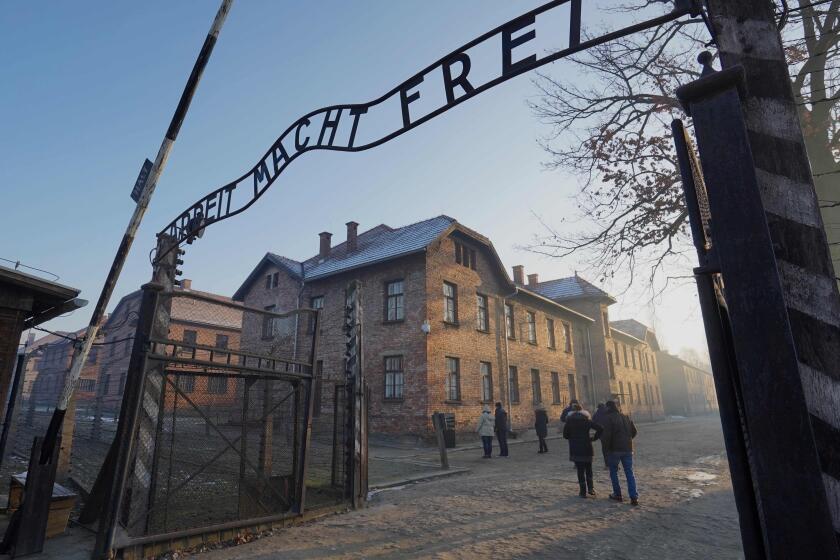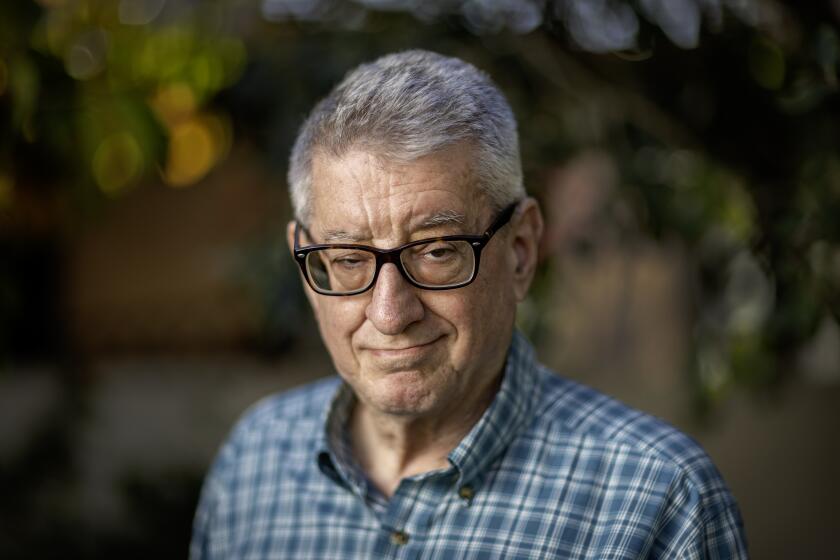In a time of rising campus antisemitism, USC gives highest honor to Holocaust survivors
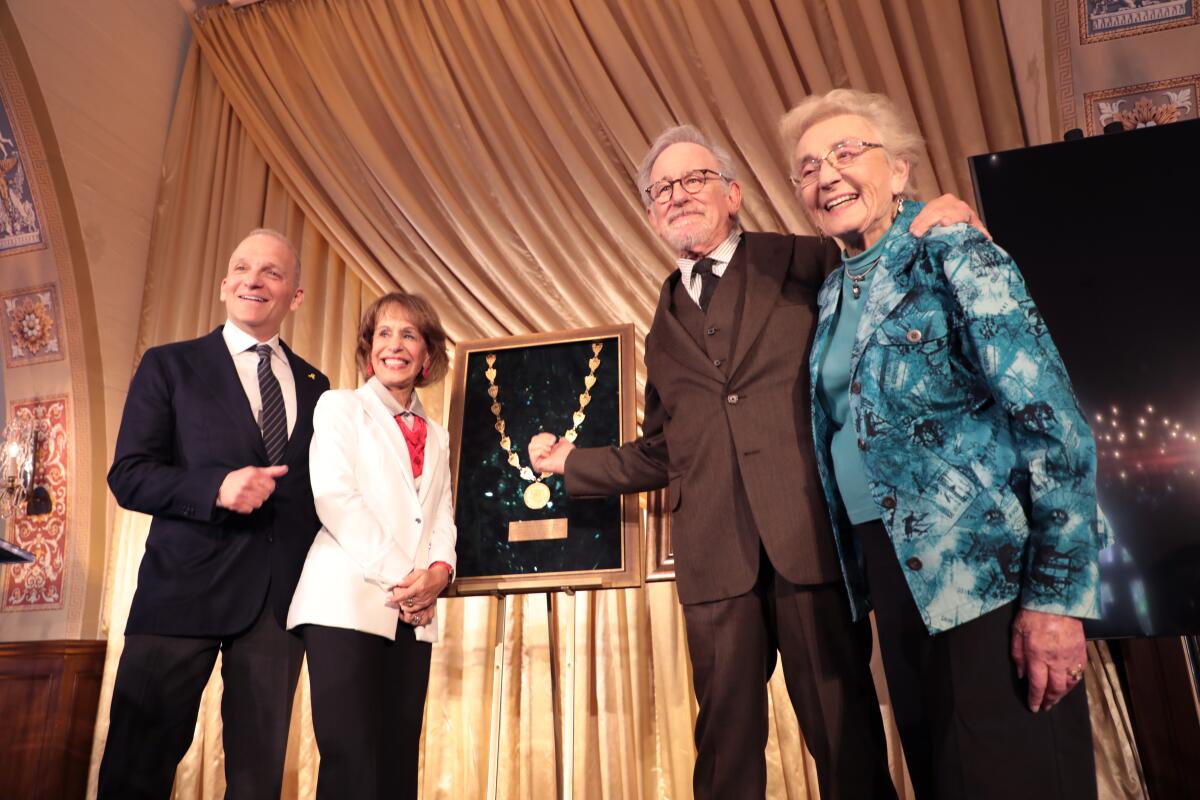
- Share via
As virulent antisemitism roils the nation’s college campuses in the wake of the Israel-Hamas war, USC is making a rare gesture to recognize the crippling effect of anti-Jewish hatred on society and the human spirit.
The university on Monday gave its highest honor — one awarded only three times in university history — to Holocaust survivors. President Carol Folt presented the gold University Medallion to victims of the Nazi regime who have taken part in preservation programs under the Shoah Foundation, a USC center that movie director Steven Spielberg founded three decades ago to document audio-visual oral histories of the dwindling global survivor community.
The award comes at a sensitive time for USC, which — like University of California campuses and colleges across the nation — has grappled with protests, infighting and strife among faculty and students over the conflict in Gaza that erupted in the wake of the Oct. 7 Hamas attack on Israel.
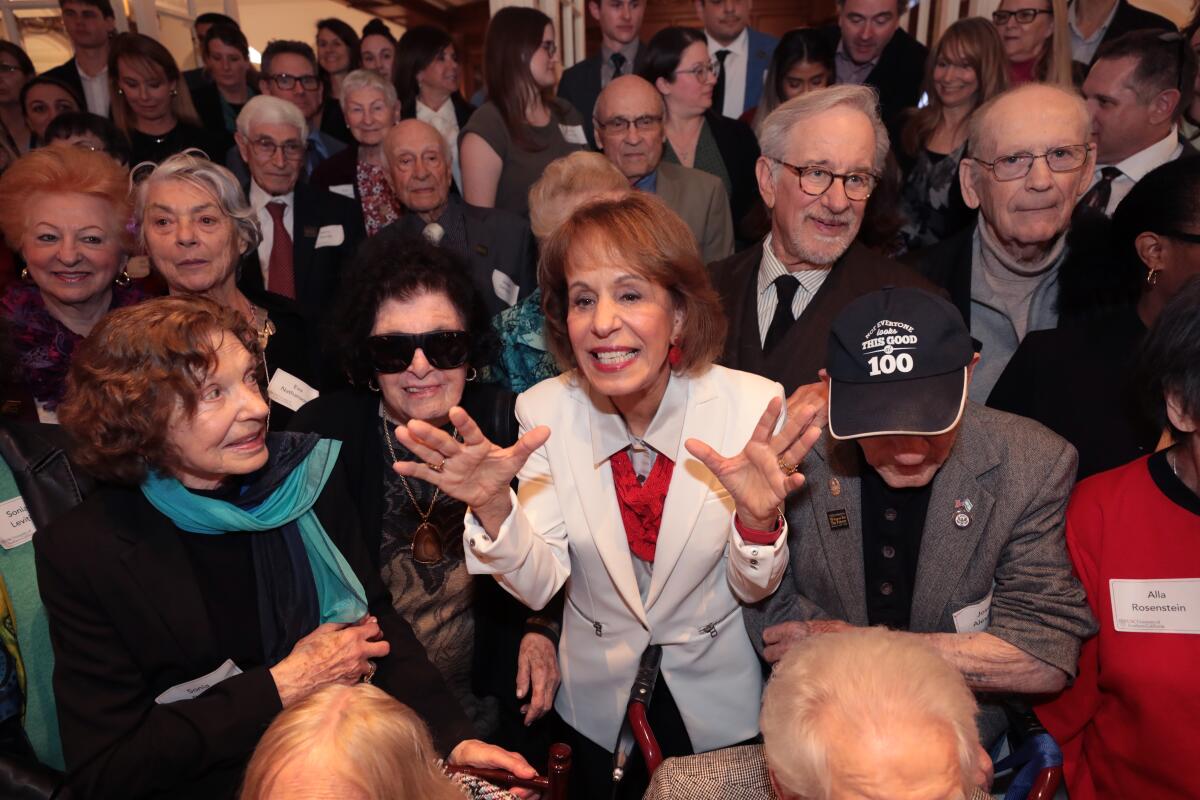
There has been a documented sharp increase in antisemitic incidents and sentiment across the U.S., in particular on college campuses. In survey results released last month, the American Jewish Committee found a quarter of college students and recent graduates said they hid the fact that they were Jewish or avoided speaking about Israel while on campus. The poll found that two-thirds of American Jews overall said they felt “less secure” over a year-to-year period.
University of California regents delayed action on a controversial proposal to control political opinion, such as criticism of Israel, from campus websites.
“We all know antisemitism is on the rise and frighteningly so, and we feel the searing pain of Oct. 7,” Folt said to more than 200 attendees at the campus ceremony, including 30 Holocaust survivors and their families.
Hamas militants killed about 1,200 people Oct. 7 and took scores hostage. Israel’s retaliatory war has killed 32,000 Palestinians, according to health officials in Hamas-controlled Gaza. The United Nations warns that 2 million Gazans are nearing famine.
Universities are going through “a painful time” in dealing with hatred and discrimination against Jews, as well as Arabs and Muslims, Folt said in an interview late last week.
“People are suffering,” said Folt, who cited the Shoah Foundation’s work in creating “important teaching tools” to combat hatred and foster inclusion. The foundation has amassed a digital archive of interviews with 56,000 Holocaust survivors, including many of the 2,500 in Southern California, out of the roughly 245,000 who are alive globally.
Spielberg told the crowd he had been the victim of verbal and physical antisemitism growing up in California and condemned the recent rise.
“Those who cannot remember the past are condemned to repeat it,” he said. “I am increasingly alarmed that we may be condemned to repeat history, once again to have to fight for the very right to be Jewish.”
He pointed to the rise of antisemitic language on college campuses and applauded USC’s move to honor Holocaust survivors.
“Stories are one of our strongest weapons in the fight against antisemitism and racial and religious hatred,” he said.
The medallion, last awarded in 2017, has previously gone to major donors, trustees and philanthropists whose names — Walter Annenberg, his daughter Wallis Annenberg and Dana and David Dornsife — are synonymous with Los Angeles society and emblazoned on USC buildings. The USC website said the award pays tribute to those who have made “major contributions to the university.” The presentation of the medallion to Holocaust survivors with fewer ties to USC is a shift.
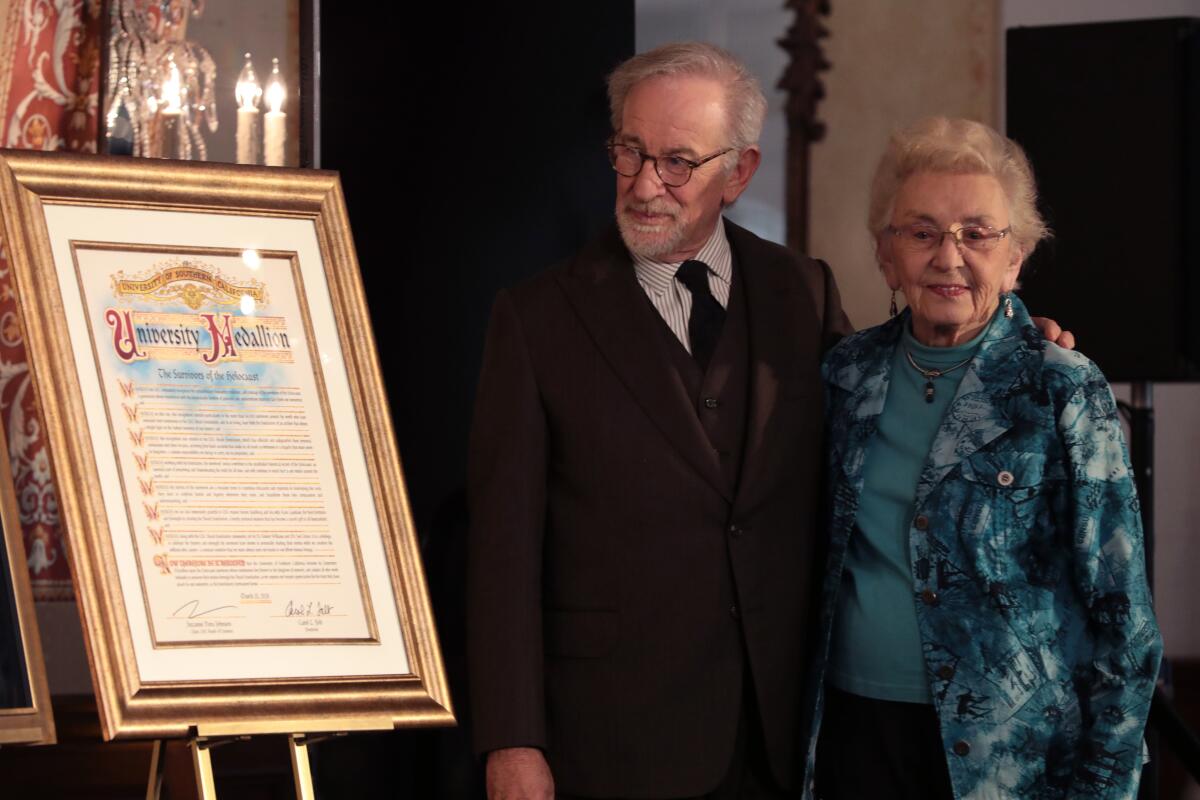
Celina Biniaz, 92, of Thousand Oaks was among those honored Monday. Biniaz left the Auschwitz-Birkenau death camp when she was 13. She survived the Holocaust because her mother and father worked for Oskar Schindler, a German industrialist who employed Jews to keep them safe from Nazis. The story led to a 1982 book that inspired Spielberg’s 1993 film “Schindler’s List.”
“Oskar Schindler gave me life, and Steven Spielberg gave me a voice,” said Biniaz, who, after liberation, made her way to New York and Iowa before settling in California. Seeing her life reflected in the film spurred her to start sharing her story, which she had kept from her son.
Biniaz recorded her nearly 90-minute testimony for the Shoah Foundation in 1996, two years after its launch. A decade later, the foundation relocated to USC, which houses its archive.
Thousands more survivor recordings followed. Additionally, the group has enlarged its collection with documentation of other atrocities, such as the Armenian genocide, Nanjing massacre, genocide against the Tutsi in Rwanda, the killing and expulsion of Rohingya Muslims from Myanmar and violence against Kurds in Northern Syria. Most recently, foundation researchers recorded testimonies of Jewish and non-Jewish victims of the Oct. 7 attacks.
“Education about the Holocaust is not enough,” said Shoah Foundation Executive Director Robert J. Williams, speaking to the importance of seeing and hearing survivors. Although the foundation has expanded the kinds of atrocities it documents, he said capturing the experiences of Palestinians in Gaza is not in his “current mandate.”
“We have a responsibility to draw attention to the persistence of antisemitism ... and to understand antisemitism and the link to terror,” he said.
Fewer than 2,000 Auschwitz survivors are still alive. One is returning to Poland from Southern California for the fourth time.
To those ends, Williams said, the group has emphasized educational programs for middle and high school students, as well as those enrolled at USC. Last summer, the foundation took USC athletes to Poland to visit Holocaust sites and meet with Jewish communities.
In recent years — and especially since October — combating antisemitism and Islamophobia has become a major focus at college campuses, including USC, which has been rocked by several high-profile episodes involving accusations of antisemitism, anti-Zionism and hate speech.
USC maintains a page on its website on “addressing antisemitism” to explain efforts to make Jewish students feel comfortable; these include the 2022 launch of an advisory committee of staff, students and local Jewish leaders to address discrimination concerns.
Folt has also renamed campus sites tainted by their association with former leaders who were anti-Jewish and anti-Black. Last year, a track stadium was renamed for Black Olympian Allyson Felix after the name of a former USC coach, Dean Cromwell, was removed. Cromwell was known for racist views and for preventing Jewish runners from qualifying for the Olympics. Folt also removed the name of former USC President Rufus von Kleinsmid, who had antisemitic views and supported eugenics, from a prominent campus building. It was renamed for Joseph Medicine Crow, a Native American alumnus who was awarded the Medal of Freedom, the nation’s highest civilian recognition.
Folt’s actions were widely hailed. But the university has faced criticism for not responding as forcefully to anti-Muslim hatred, seen on campus in recent months. Hundreds of alumni sent a letter to Folt last fall calling her out for not doing enough to combat “growing racist, Islamophobic and anti-Arab sentiment.” Since last year, USC has had a committee on Muslim campus life to ensure USC “remains a destination university” for Muslims. Unlike its efforts against antisemitism, USC does not dedicate a part of its website to countering Islamophobia.
The Nov. 9 incident at USC over the Israel-Hamas war went viral online, prompting thousands to sign opposing petitions to fire and reinstate John Strauss.
Recent research suggests there is work to be done on antisemitism. A December report from Brandeis University that looked at antisemitism and anti-Israel hostility at 51 U.S. colleges and universities with large Jewish populations ranked USC as having “above average hostility.” The university fared better than UC Berkeley, UCLA and UC San Diego; was ranked equal to UC Davis and UC Santa Barbara; and was ranked worse than San Diego State.
Local Jewish leaders said those findings and research showing an alarming persistence of Holocaust denial and antisemitism on college campuses make USC’s award to survivors even more significant.
“When it comes to campus antisemitism, it’s almost like somebody dumped kerosene on a fire after Oct. 7,” said Jewish Federation Los Angeles President Rabbi Noah Farkas. He said centering the stories of Holocaust survivors can give students “a vision of the world we don’t want to see — where they understand that all hell on Earth is possible — and help citizens create a vision of a world they do want to see.”
David Wolpe, rabbi emeritus of Temple Sinai in Los Angeles and a visiting scholar at Harvard Divinity School, said he views the Shoah Foundation’s work as a way to warn students and society at large about the “consequences of ideas.”
“The ability to manipulate ideas is a characteristic of intellectuals, which makes them valuable and dangerous,” Wolpe said. “Dangerous, because we know that in Nazi Germany, the intellectuals were the most fervent Nazis.”
Folt recalled that one her first acts after being appointed university president in 2019 was to see the Shoah Foundation’s digital collection.
“I was deeply, deeply touched,” she said of the experience. “I took what I think is a solemn promise to do everything I could to ensure they were protected and saved.”
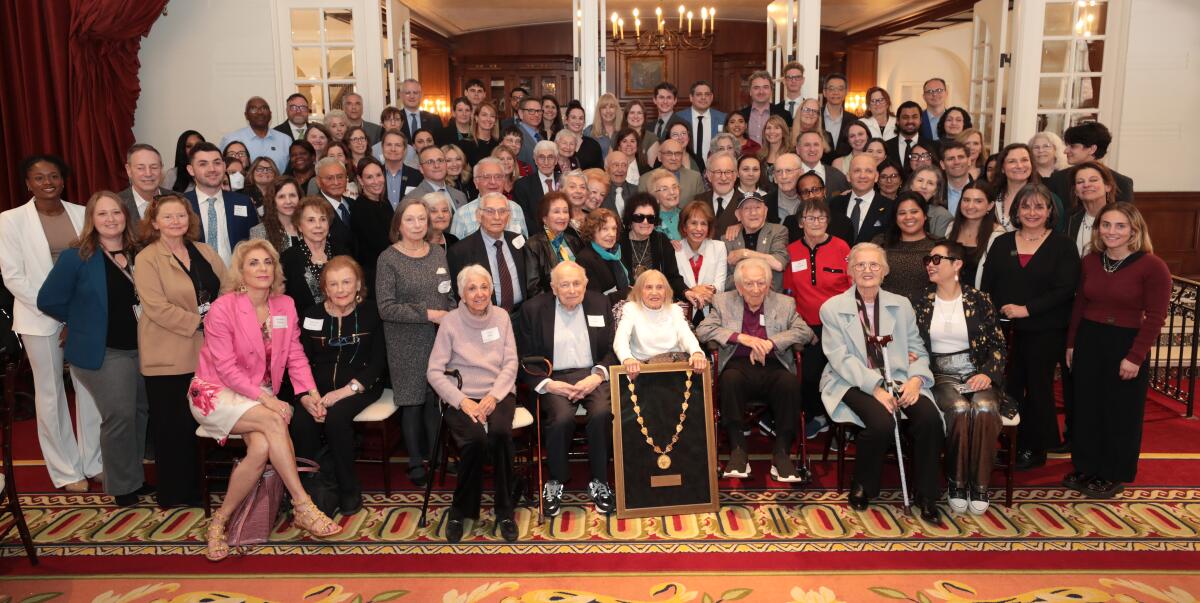
More to Read
Sign up for Essential California
The most important California stories and recommendations in your inbox every morning.
You may occasionally receive promotional content from the Los Angeles Times.

